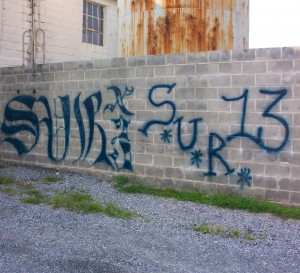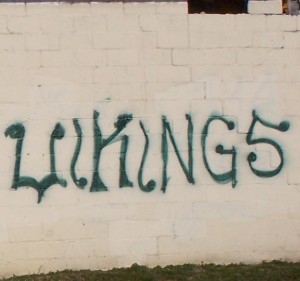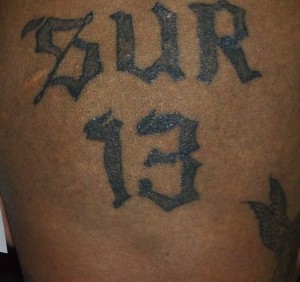D.A. credits teamwork for quick passage of legislation

Graffiti often signals the presence of rival gangs who want to mark their territory, according to police.
By Kathleen Brady Shea, Managing Editor, The Times
At a December bonfire gathering in New Garden Township, gang rivalry turned deadly as knife-wielding assailants killed two partygoers.
The homicides resulted in the enactment of anti-gang legislation, introduced less than three months ago and signed into law today by Gov. Tom Corbett, said Chester County District Attorney Tom Hogan.
“Out of the ashes of a tragedy, good things can grow,” said Hogan. “This legislation provides prosecutors with a vital tool to help protect our children from gangs.”
The impetus for the legislation, sponsored by Senate Majority Leader Dominic Pileggi, occurred Dec. 3 when Cuahuctemoc Bedolla, 27, and Jose Rodriguez, 29, died at the hands of a group of rival gang members at an outdoor party. Twelve defendants were eventually charged in the killings.
After the arrests, Hogan said New Garden Township Police Chief Gerald Simpson approached him to discuss legislation to prevent the kind of violence spurred by the double homicide, which was reportedly sparked by hatred between the Sur 13 and Viking gangs.
“Fighting gangs was an area that simply was not addressed by Pennsylvania law,” said Simpson. “After the murders, local parents were telling me that they were afraid that their kids would get pulled into gang life. We needed a way to prevent our young people from being lured into these violent gangs.”
Hogan said he met with Pileggi, who applauded the rationale for the law and worked with Senators John Rafferty and Ted Erickson to co-sponsor the legislation, which was supported by all county legislators. The Pennsylvania Senate approved the bill 45-3; the Pennsylvania House approved the bill 195-0, Hogan said.
“Gang violence impacts communities all across Pennsylvania: urban, suburban, and rural,” said Pileggi. “I’m pleased that we will have a law on the books giving prosecutors powerful new tools to combat the spread of gang activity.”
Hogan said the bill makes it a crime to recruit people into criminal gangs, with an increased penalty depending on the level of force used. Using threats or intimidation is a misdemeanor, while causing injury to recruit for a criminal gang is a felony. The grading of the crime increases if the victim is a juvenile. The bill also adds sentencing enhancements for gang-related crimes, Hogan said.
Chester County Detective Joe Nangle, a recognized gang expert, explained why the measure was needed. “In areas where gangs already exist, the gangs recruit juveniles to feed their ranks. In addition, gangs believe that juveniles face more lenient treatment in the criminal system, so the juveniles are sent to do the ‘dirty work’ for the gang,” Nangle said.
Nangle pointed out that juveniles are at risk even in areas where gangs do not exist. “Gangs often start recruiting by approaching juveniles, as they are most susceptible to the lure of gang life,” he said. “So no matter where you live, this legislation gives law enforcement a weapon to prevent gangs from forming or to choke off existing gangs.”
Authorities say the largest local Hispanic gang is the Sureños, also known as the Sur 13s, which is Spanish for south 13, a reference to Southern California and the 13th letter of the alphabet – signifying marijuana or mafia, depending on the faction. Local police said that while area members have adopted Sureño icons in tattoos and grafitti – a triangle of three dots or the Roman numeral 13 – they have no ties to a larger organization. The Vikings, also known as the Vaqueros, originated in southern Chester County to protect themselves from the Sureños, police said.
Hogan said teamwork throughout Chester County facilitated the law’s passage. “In most places, it takes years to get any legislation through. In Chester County, Chief Simpson identified a problem and proposed a solution. We discussed the issue and brought it to Senator Pileggi. Senator Pileggi immediately recognized the merits of the bill and made sure that it became the law of Pennsylvania within months.”
Hogan said gang life typically leads to prison or death. “Hopefully, this legislation will save a few lives,” he said.






